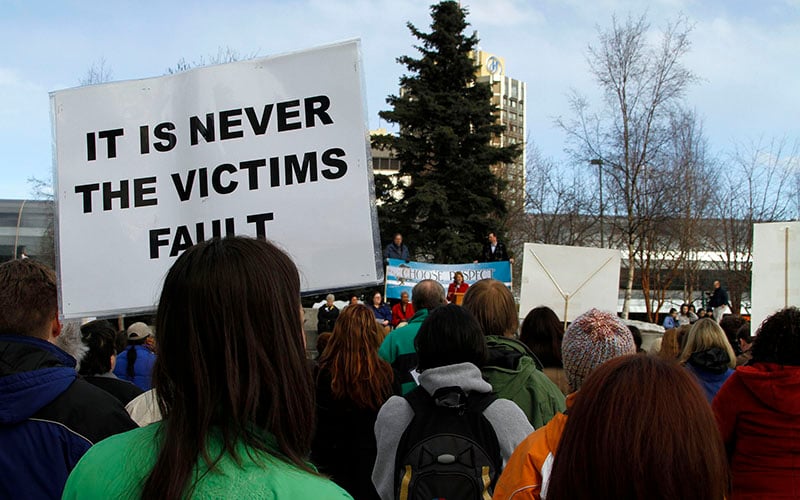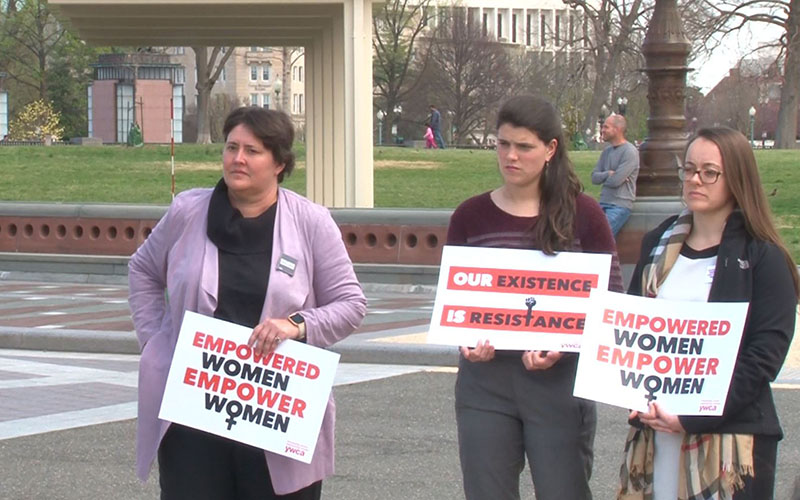
U visas allow immigrants who are victims of domestic violence to get a temporary green card, among other benefits. The number of applications has risen sharply in recent years – but so has the number flagged by authorities for potential fraud. (Photo by Al Grillo/Alaska Governor’s Office)
WASHINGTON – Applications for “domestic violence green cards” have risen steadily since the reauthorization of the Violence Against Women Act in 2013, but the percentage flagged possibly fraudulent has risen at an even faster pace.
Whether that’s because government officials are more suspicious of immigrant applicants or merely doing their jobs – or whether it’s actually fraud – depends on who’s talking.
“Claiming that victims of domestic violence are using this provision as a way of pursuing a legal status in the country can harm real victims,” Ana Natalia Otero, co-founder and executive director of D.C. Survivors and Advocates for Empowerment, said in an email.
But an official with the Government Accountability Office, which investigated possible abuses of the “U visa” program at the request of two Senate Republicans, said the agency’s report was “not necessarily picking on the VAWA self-petition program.”
“All federal programs have fraud risks,” said Rebecca Shea, GAO director of forensic audits and investigative services. “All federal programs are required to manage them.”
The U-visa program is designed to protect foreign nationals who suffer sexual or domestic violence at the hands of an American citizen or permanent resident. U-visa holders are allowed to stay in the country while law enforcement officials investigate the criminal complaint and are also eligible for citizenship, employment and education opportunities.
While green cards typically require an American citizen, such as an employer or relative, to sponsor the application, immigrants can apply for U visas on their own – as long as they were in a legitimate marriage or other family relationship.
The self-petition process was allowed by the Immigration and Nationality Act under VAWA, which was first passed in 1994. VAWA was most recently reauthorized in 2013 and expired in February. A bill to reauthorize VAWA passed the House in April, but has stalled in the Senate.
Members of Congress have long worried about the immigration benefits afforded by the U visa, and GOP Sens. Lindsey Graham of South Carolina and Chuck Grassley of Iowa asked for the GAO review of the program.
The report found that U.S. Citizenship and Immigration Services, which oversees the U-visa program, suspected 198 applications of fraud among the 7,360 applications it received in 2014. By 2018, that number increased to 801 suspect applications, or about 6% of the 12,801 self-petitions filed that year, the GAO report said.
Potential fraud is a major concern for USCIS, Shea said. The GAO report flagged questionable trends in USCIS data, including the same addresses, Social Security numbers and alien numbers being used in multiple applications. In one case, a single address was used in 845 separate self-petitions.
“You’ve got risk to the program integrity,” Shea said. “If these self-petitions are being approved for people who are fraudulently married or not actually eligible for the program, that creates a reputational risk for USCIS and the program as a whole.”
But one advocate fears that the end result of the investigation may be to modify VAWA and restrict the benefits it offers immigrants. That would only add to challenges victims already face, such as isolation by abusers or unfamiliarity with English, said Grace Huang, policy director at the Asian Pacific Institute on Gender-Based Violence.
“Whatever proposals are being offered, understand the reality of the barriers that immigrant survivors have in getting help,” she said.˜
Huang pointed to the fact that some immigrant communities already discourage survivors from speaking out about domestic abuse. And those that do might struggle to find advocates afterward.
Both Huang and Otero concede that there are likely some cases of fraud in the system – and they need to be rooted out because they only hurt victims in need.
As long as stories of survivors continue to be mistrusted, “we’re putting people in more danger,” Otero said. “We are allowing violence to continue in our communities.”
She said one possible explanation for the rise in suspect applications might be misinformation by third parties. She said in a phone interview that she has handled immigrants misled by “notaries,” who advise them to apply even though they are ineligible.
“It is a shame to know that there are people that may be taking advantage of an already vulnerable population and misusing the VAWA provisions,” Otero said. “There are hundreds of immigrants that are going through domestic abuse thinking that the laws will not protect them because of their immigration status.”

